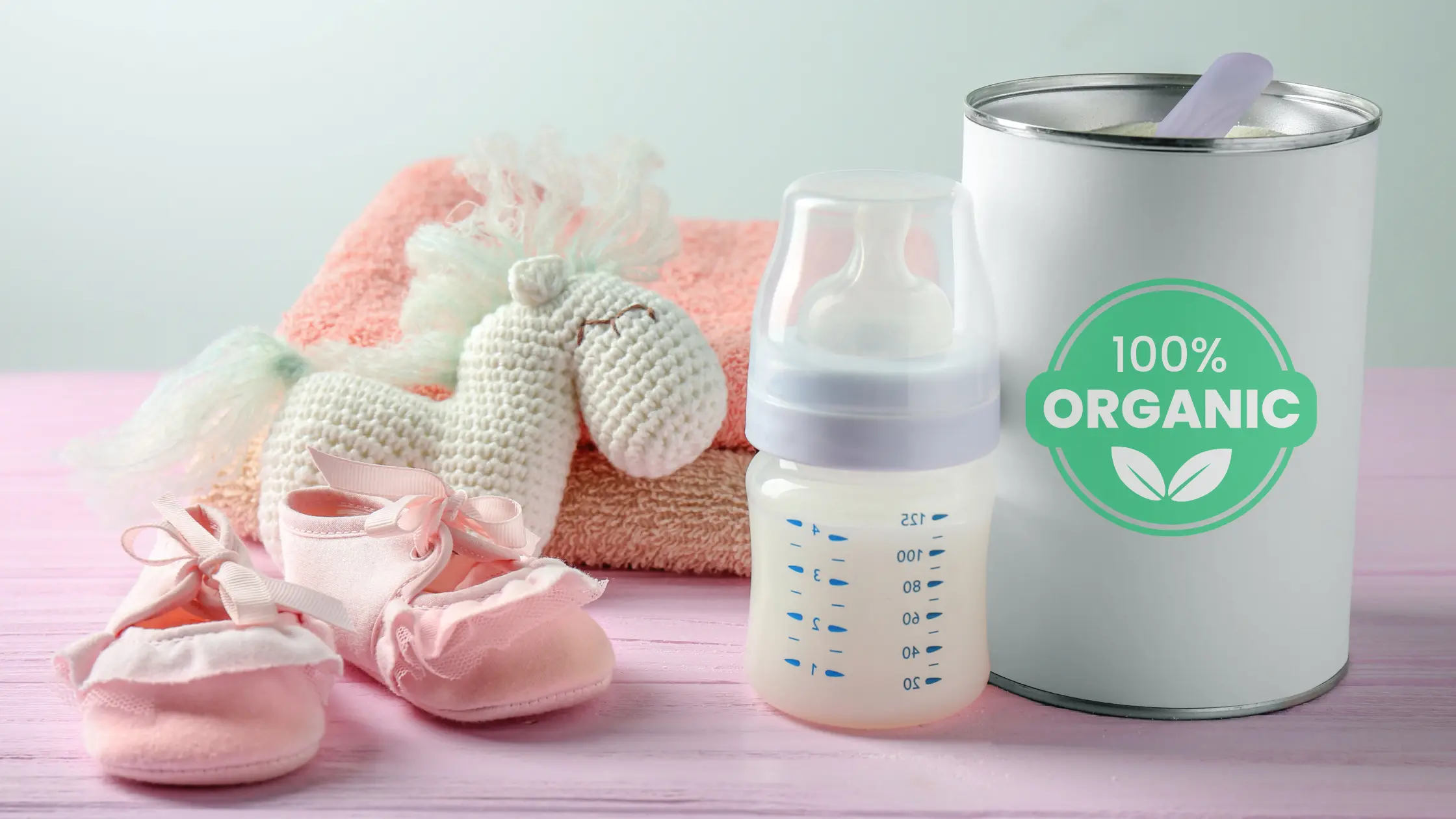The formula you choose to feed your child has a significant impact on their development and growth. For parents looking for natural and chemical-free options for their infants, the best organic baby formula is the best option. Organic formulas are healthier for babies, especially those who are not breastfed, because they are made from ingredients that are grown without the use of hormones, pesticides, or antibiotics.
What is Organic Baby Formula?
Organic baby formula is made from certified organic ingredients that adhere to strict farming and production standards. There are no synthetic pesticides, fertilizers, or genetically modified organisms (GMOs) in these formulas. Organic baby formulas are made with care to include vital nutrients for healthy growth and development, like vitamins, DHA, and ARA. By selecting organic baby formula, you can give your child a healthy substitute for conventional formulas without worrying about dangerous chemicals or artificial additives. With many organic options that include probiotics, prebiotics, and easily digestible proteins, these formulas are also made to be kinder to your baby’s digestive system. By choosing an organic formula, parents can support sustainable, environmentally friendly farming practices and ensure their baby’s health and well-being.
Table of Contents
- What is Organic Baby Formula?
- Why Choose the Best Organic Baby Formula?
- Formula for Breastfed Babies
- Best Organic Baby Formulas: Top 5 Trustworthy Brands
- Choose the Best Organic Baby Formula
- What to Look for in the Best Organic Baby Formula for Breastfed Babies
- Health Benefits of Organic Baby Formula
- Potential Drawbacks of Organic Baby Formula
- FAQ Section on Choosing the Best Organic Baby Formula
- Conclusion: Best Organic Baby Formula
Why Choose the Best Organic Baby Formula?

Because organic formulas have so many benefits over conventional ones, parents frequently choose them for a variety of reasons. Your baby’s overall health and development can be significantly impacted by selecting the best organic baby formula. Parents choose organic baby formulas for the following main reasons:
Natural Ingredients:
Premium, natural ingredients like organic milk and organic plant-based oils are used to make organic baby formulas. These formulas provide your baby with a pure and safe feeding option because they are devoid of dangerous chemicals, pesticides, and genetically modified organisms (GMOs). Additionally, organic ingredients come from farms that adhere to stringent organic farming guidelines, protecting your child from artificial chemicals typically present in formulas made conventionally.
Healthier Choice:
The healthier makeup of organic baby formulas is a major factor in parents’ decisions. Compared to non-organic formulas, organic formulas usually have fewer artificial ingredients, preservatives, and additives. They are therefore less taxing on your infant’s delicate digestive tract. By using an organic formula, you reduce the likelihood that your child will come into contact with potentially dangerous synthetic ingredients that could upset their stomach or trigger allergic reactions.
Environmental Impact:
Organic farming methods are more environmentally friendly. With organic baby formula, you will be encouraging environmentally friendly and sustainable agricultural practices wwell-beingritize the health of the land, water, and the ecosystem. Artificial pesticides and fertilizers are harmful to the environment and pollute streams, which is why organic farmers avoid them. Moreover, organic agriculture reduces the carbon footprint of food production and contributes to biodiversity. The purchase of organic products helps to make the environment healthier where your child will grow up.
Free from Harmful Additives and Chemicals:
Organic baby formulas are typically free from growth hormones, antibiotics, and other synthetic additives commonly found in conventional formulas. These substances may be used in traditional dairy farming to accelerate growth and prevent disease, but they may leave traces in the formula, which could potentially have negative health effects on your baby. Organic formulas eliminate these risks, offering a cleaner, safer option for feeding your child.
Better for Sensitive Stomachs:
Organic formulas are often easier on babies’ digestive systems. Most organic recipes are sensitive to tummies and usually contain no artificial sweeteners, colorants, or other unnecessary chemicals that might cause discomfort or irritation to the stomach. These ingredients are absent, so organic formulas have a less likely chance of causing gastroesophageal reflux. This makes them more suitable in cases of constipation, gas, or colic that might occur in the baby using other formulas.
Promotes Immune System Health:
Many organic formulas include added nutrients such as prebiotics and probiotics, which help promote the growth of healthy bacteria in your baby’s digestive tract. These ingredients support a strong immune system, reducing the risk of infections and promoting overall health. Since organic formulas focus on natural and wholesome ingredients, they provide essential nutrients like Omega-3 fatty acids, vitamins, and minerals that support your baby’s development, immune system, and brain health.
More Nutritional Balance:
Organic baby formulas often prioritize the nutritional needs of your baby by offering a well-rounded composition of essential nutrients. These recipes offer a well-balanced mix of vitamins, proteins, fats, and carbs to promote healthy growth and development. Additionally, DHA and ARA, which are essential fatty acids that are naturally present in breast milk and are vital for the development of your baby’s brain and eyes during the first few months of life, are added to a lot of organic formulas.
Proteins, fats, carbs, and vitamins are all balanced in these formulas to promote healthy growth and development. Furthermore, DHA and ARA, essential fatty acids that are naturally present in breast milk and are vital for the development of your baby’s brain and eyes during the first few months of life, are added to a lot of organic formulas. With so many health and environmental benefits, choosing organic for your baby is not just a choice for today—it’s an investment in your baby’s future health and well-being
Formula for Breastfed Babies
Breastfeeding is undeniably the best option for nourishing your baby. However, many moms use organic baby formula to add to their infant’s diet, particularly when breastfeeding isn’t feasible or formula is required. The best organic formula for breastfed babies is a nutritious substitute because it contains nutrients that are similar to those in breast milk. Here are a few of the best organic baby formulas to think about if you’re searching for the best options:
Best Organic Baby Formulas: Top 5 Trustworthy Brands
1. Bobbie Organic Infant Formula
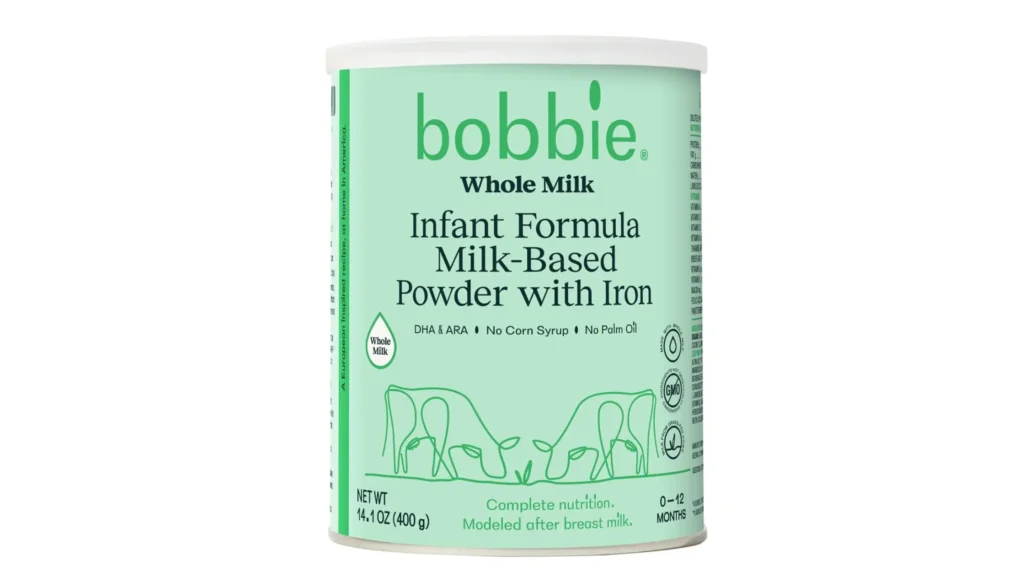
A high-quality milk-based powder called Bobbie Organic Infant Formula was created to mimic the nutritional makeup of breast milk. Vitamin D and DHA, which are necessary for healthy brain development and immune system support, are included in this formula. Bobbie takes pride in its dedication to using clean, organic ingredients; they make sure that their formula is free of dangerous chemicals and artificial additives. Bobbie’s formula, which is made with premium organic milk, gives infants ages 0 to 12 months the ideal ratio of nutrients. For parents seeking a convenient and wholesome choice, the 14.1 oz size is ideal. To support your baby’s growth and development, Bobbie provides a reliable and safe substitute for formula, whether you are using it exclusively or in addition to breastfeeding. This recipe, which is sold on Amazon, provides the best nutrition possible without the use of artificial flavors, preservatives, or corn syrup solids. You can be sure that your baby is receiving a pure, nutrient-dense feeding solution because it only uses organic ingredients that are free of genetically modified organisms. Furthermore, Bobbie’s dedication to sustainability ensures that the milk comes from farms that practice morality and environmental responsibility, protecting the health of the earth and your unborn child. Parents can rest easy knowing their baby is getting the best nutrition possible for healthy growth and development, thanks to Bobbie’s clean, transparent ingredient sourcing. Bobbie is a responsible and environmentally friendly option for organic baby nutrition since parents who choose it also help to create a healthier planet. Additionally, parents can feel secure knowing that their infant is receiving only the healthiest, most carefully chosen nutrients thanks to Bobbie’s meticulous ingredient sourcing.
2. Happy Baby Organics Infant Formula
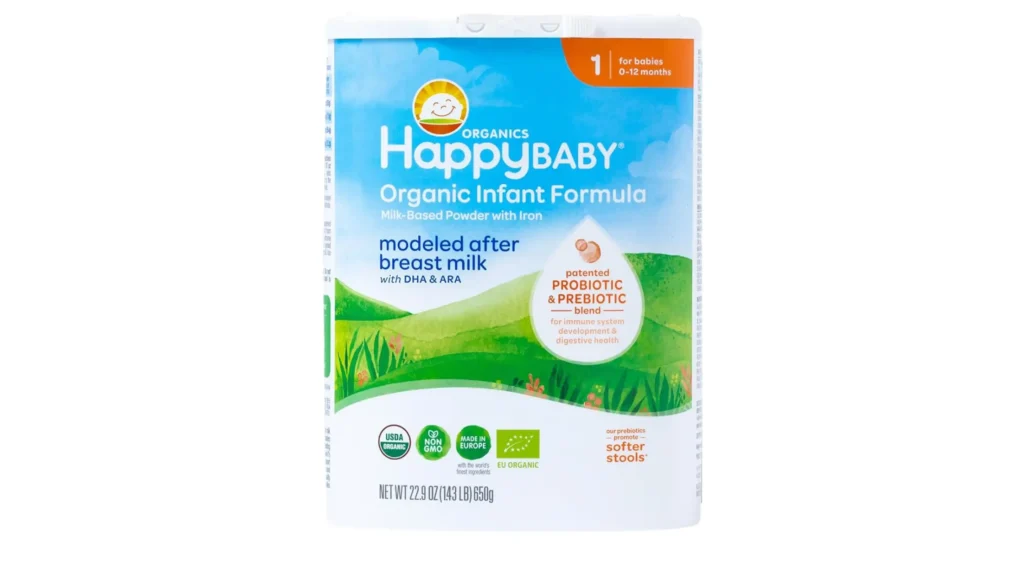
A milk-based powder called Happy Baby Organics Infant Formula was created especially to replicate the natural makeup of breast milk. This formula, which is perfect for infants ages 0 to 12 months, is full of vital nutrients like DHA, ARA, and prebiotics that promote healthy digestion, brain, and eye development. Prebiotics help maintain a healthy gut microbiome, and essential fatty acids like DHA and ARA support brain function. The formula provides a safe and hygienic substitute for traditional formulas because it is certified organic and devoid of artificial additives. Additionally, Happy Baby Organics guarantees that the ingredients come from environmentally responsible, sustainable farms. Parents will find the 21-oz size convenient as it offers a substantial amount of formula. Due to its availability on Amazon, this product is a convenient choice for parents searching for a premium organic formula for their infants. Happy Baby Organics, which emphasizes clean, sustainable sourcing, supports ethical farming methods that benefit the environment and future generations, in addition to offering vital nutrients. The natural, organic ingredients in this formula provide a healthy choice that promotes your baby’s development in a way that is both safe and kind to the environment. Happy Baby Organics is a truly holistic choice for conscientious parents because it prioritizes sustainability and offers your baby the best nutrition possible during their early years while also promoting a greener world. Happy Baby Organics also actively promotes animal welfare and environmental conservation, guaranteeing a product that satisfies moral principles while providing nutrition for your child.
3. Kabrita Goat Milk-Based Infant Formula
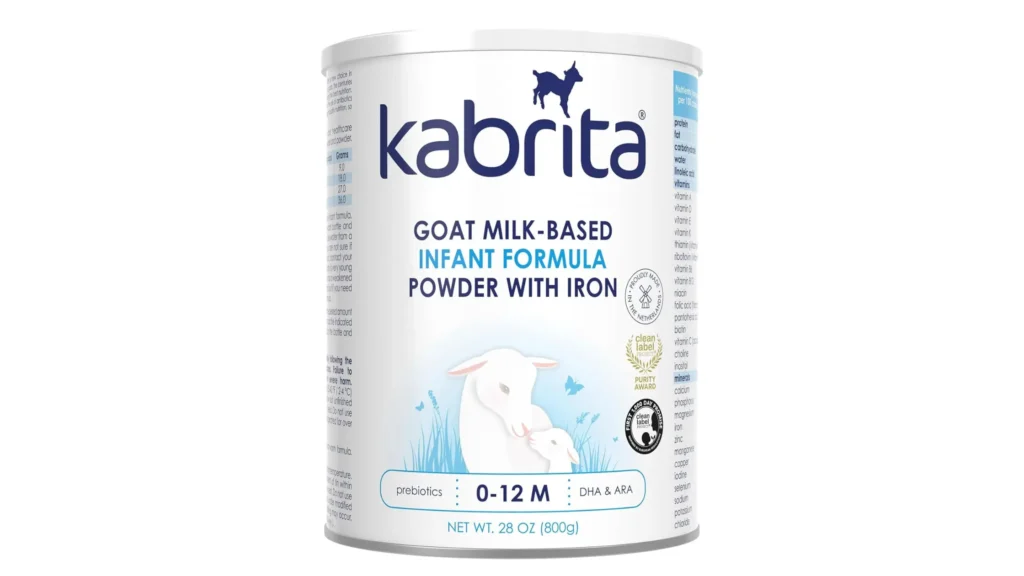
Kabrita Goat Milk-Based Infant Formula is a great option for infants with mild milk sensitivities or sensitive tummies because it provides a healthy and gentle substitute for conventional cow’s milk formulas. Because of its distinct protein structure and smaller fat molecules, this formula, which is made from premium goat milk, is inherently easier to digest. Kabrita, which is enhanced with DHA, ARA, and prebiotics, promotes a healthy gut microbiome and aids in the development of the immune system, brain, and eyes. For infants ages 0 to 12 months, Kabrita offers pure, organic nutrition devoid of artificial flavors, preservatives, and corn syrup solids. It is a reliable option for parents looking for a high-quality, safe infant formula because of its nutrient-rich formula, which guarantees that your baby gets the best nutrition possible in a form that is gentle and easy to digest. Kabrita’s dedication to ethical sourcing and sustainability also guarantees that the ingredients are produced responsibly, providing the best care for the environment and your baby. Kabrita, which comes in a handy 28-ounce size, provides a substantial amount of formula to satisfy your baby’s requirements and promote healthy growth and development during the early years of life. The formula is a great option for babies with food sensitivities or digestive problems because its special goat milk base is also free of common allergens found in cow’s milk. Kabrita’s focus on sustainability and use of clean, organic ingredients gives parents peace of mind that their infant is getting a healthy, gentle start in life.
4. ByHeart Whole Nutrition Infant Formula
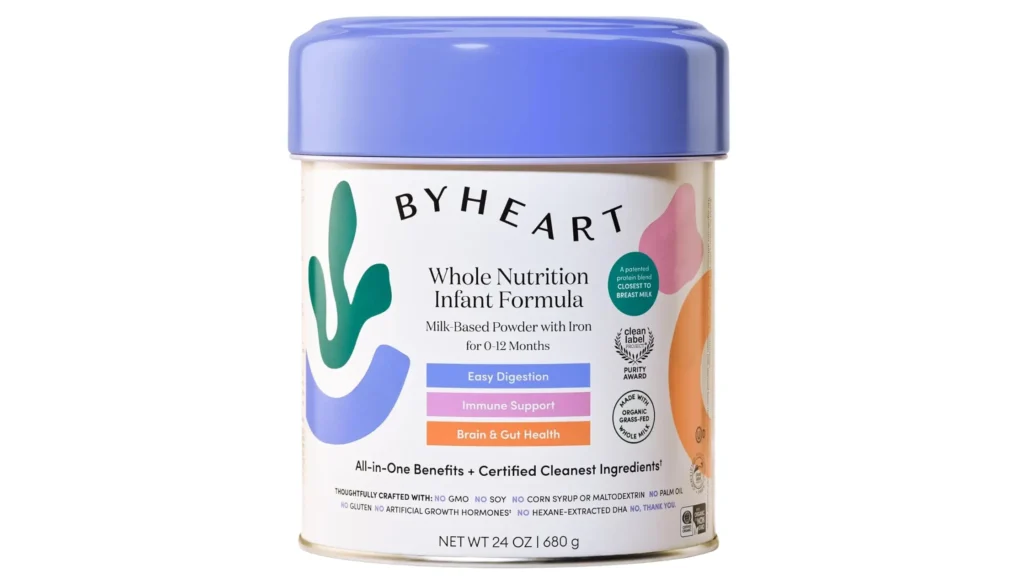
Made with premium, grass-fed whole milk, ByHeart Whole Nutrition Infant Formula is a powdered milk substitute that closely resembles breast milk. This formula offers a simple, clean feeding solution free of artificial ingredients and additives, making it perfect for infants ages 0 to 12 months. ByHeart prioritizes openness and uses clean ingredients and whole milk to promote your baby’s healthy growth. In addition to other vitamins and minerals for optimum growth, the formula contains vital nutrients like DHA and ARA to support brain and eye development. ByHeart is a fantastic option for parents seeking a natural, clean formula, and it comes in a handy 24-ounce size. ByHeart, which is sold on Amazon, is a fantastic substitute for parents looking to give their infant an organic, nutrient-rich formula. ByHeart gives parents who want the best nutrition for their baby peace of mind with its clean label and easy-to-follow whole milk formula. ByHeart’s dedication to openness and ease of use guarantees that parents can rely on the nutritional advantages and purity of the formula. Because this formula doesn’t contain any artificial additives, your baby will be getting healthy, natural nourishment that closely resembles the makeup of breast milk for the best possible developmental support. Your baby will receive all the nutrients they require for healthy growth thanks to the whole milk formula’s rich and balanced nutrient profile. Additionally, ByHeart is made with an emphasis on sustainability, utilizing ingredients that are sourced ethically to support the environment and your baby’s health. For environmentally conscious families, this makes it a thoughtful option.
5. Pure Bliss by Similac Organic Infant Formula
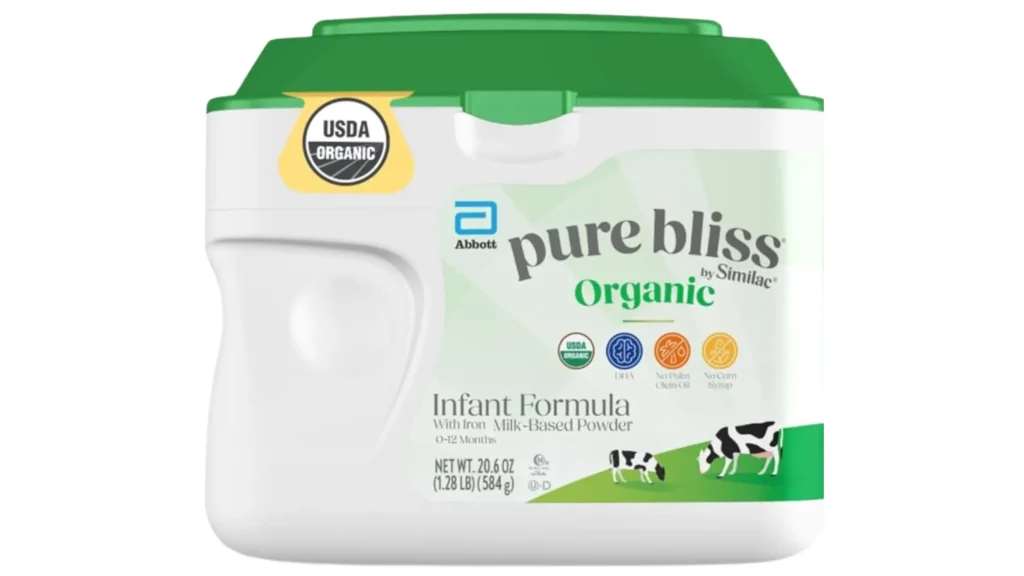
A powder made from cow’s milk, Pure Bliss by Similac Organic Infant Formula is intended to give your child healthy, organic nourishment. It contains prebiotics, DHA, and ARA, all of which are critical for the development of the brain and eyes as well as for maintaining a healthy digestive system. Organic milk from grass-fed cows is used to make Similac’s formula, guaranteeing a pure, premium product. With only natural ingredients, the formula gives your baby the best start in life by being free of artificial flavors, colors, and preservatives. The 20.6 oz size is convenient for parents who want a dependable and nourishing solution for their baby’s feeding needs, and it is suitable for babies ages 0 to 12 months. For parents looking for a premium, organic formula, Pure Bliss by Similac Organic Infant Formula is a reliable choice that is sold on Amazon. It guarantees that your baby’s health is supported from the start by emphasizing the use of natural nutrients and organic ingredients. Pure Bliss gives parents a healthy, wholesome way to promote their child’s natural growth and development. This formula also includes essential proteins and fatty acids that help build your baby’s immune system, which promotes overall health and development throughout the first year of life. With its organic milk and prebiotics, Pure Bliss promotes healthy digestion and guarantees your baby receives the best nutrients for a strong immune system. Additionally, the formula’s commitment to organic sourcing guarantees that it satisfies the highest purity standards, providing your child with a safe, effective feeding solution that promotes their long-term health and wellbeing.
Choose the Best Organic Baby Formula
A number of factors need to be carefully considered when selecting the best organic baby formula for your child. It’s crucial to make sure the formula contains all the nutrients your child needs for healthy development because their growth and well-being are greatly influenced by the nutrients they consume. Here are some tips for choosing the best organic formula:

Nutritional Content
Your primary concern when choosing the best organic baby formula should be its nutritional value. Choose a formula that offers a well-balanced combination of the proteins, fats, carbohydrates, vitamins, and minerals your baby needs to grow. Because breast milk is naturally high in these nutrients, a quality organic formula will closely resemble it.
Important nutrients to think about are:
- Proteins: These aid in tissue growth and repair. Whey-based or casein-based proteins, which are both present in breast milk, are commonly included in organic formulas. Younger babies prefer whey because it is typically easier to digest.
- Fats: Healthy fats are essential for brain development. Organic formulas should contain high-quality fats, such as those derived from organic oils like coconut oil or sunflower oil.
- Carbohydrates: Organic lactose is the ideal carbohydrate source, as it closely mirrors the natural sugar found in breast milk. Avoid formulas that use corn syrup solids or other artificial sweeteners as their primary carbohydrate source.
- Vitamins and Minerals: Look for a formula fortified with vitamins (like A, D, and E) and minerals (like calcium and iron), which are necessary for healthy bone development, immune function, and overall growth.
The nutritional profile of an organic formula should reflect the balance found in breast milk to ensure that your baby is getting the best possible start in life.
Type of Milk
Another important factor to consider when choosing an organic formula is the type of milk used. Organic formulas can be based on different milk sources, and selecting the right one depends on your baby’s specific needs and any sensitivities they may have.
- Cow’s/Goat’s Milk: The most common base for best organic baby formulas is cow’s/goat’s milk. Organic cow’s milk formulas are highly nutritious and typically contain a good balance of fats, proteins, and carbohydrates. However, some babies may be allergic or intolerant to dairy, so it’s important to monitor your baby for any adverse reactions.
- Plant-Based Milks: There are organic formulas made with plant-based milks like soy, coconut, or almond milk if your baby is sensitive to cow’s milk. For infants with lactose intolerance or milk allergies, these options are usually easier to digest. However, plant-based formulas may lack certain essential fatty acids or proteins found in cow’s milk, so you should consult your pediatrician to ensure the formula provides adequate nutrition.
Always check the label for allergens or ingredients that may not align with your baby’s dietary needs. For example, if your baby is allergic to soy, it’s important to choose a formula that is soy-free.
DHA & ARA
DHA (Docosahexaenoic acid) and ARA (Arachidonic acid) are essential fatty acids commonly found in breast milk. These fatty acids play a critical role in brain and eye development during your baby’s early months. Organic formulas often contain DHA and ARA to help replicate the nutrients found in breast milk.
- DHA is an omega-3 fatty acid that supports brain function, cognitive development, and vision.
- ARA is an omega-6 fatty acid that helps with brain development and immune function.
When choosing an organic formula, it’s important to select one that includes DHA and ARA in adequate amounts, as these nutrients are vital for your baby’s overall development. Look for formulas that state they are enriched with these essential fatty acids, often derived from organic algae or other natural sources.
Other Considerations
When selecting the best organic baby formula, take into account the following additional factors in addition to the ones listed above:
- Prebiotics and Probiotics: These good bacteria help maintain immunological and digestive health. Prebiotics, which support the development of beneficial bacteria in the gut, are found in many organic formulas. Probiotics, which can boost immunity and lessen the chance of constipation or colic, are also included in some formulas.
- Non-GMO Certification: Choose a formula that is non-GMO (genetically modified organism) certified to ensure that it is made with natural, non-altered ingredients. Organic formulas are typically non-GMO, but it’s always good to double-check.
- Additives and Artificial Ingredients: Although organic recipes typically steer clear of dangerous chemicals and additives, it’s still a good idea to carefully read labels to make sure the recipe doesn’t contain any artificial flavors, colors, or preservatives. These ingredients may cause allergies or sensitivities in your baby and may be more difficult for them to digest.
- Certification and Transparency: Make sure the formula has received organic certification from reputable agencies like the European Union Organic Certification or the USDA. To guarantee that the recipe satisfies the strictest organic requirements, transparency in the sourcing and manufacturing of ingredients is crucial.
Consulting Your Pediatrician
Although organic baby formulas are a great option, every baby is different, and your pediatrician can offer customized guidance based on your child’s medical requirements. Your pediatrician can assist you in choosing the best organic formula for your child if you’re switching from breastfeeding to formula feeding or if you have concerns about allergies or sensitivities.
By considering these factors—nutritional content, type of milk, DHA & ARA content, and other key ingredients—you can confidently choose the best organic baby formula for your little one. Always opt for a formula that provides balanced, nutrient-rich ingredients to support your baby’s growth and development.
What to Look for in the Best Organic Baby Formula for Breastfed Babies
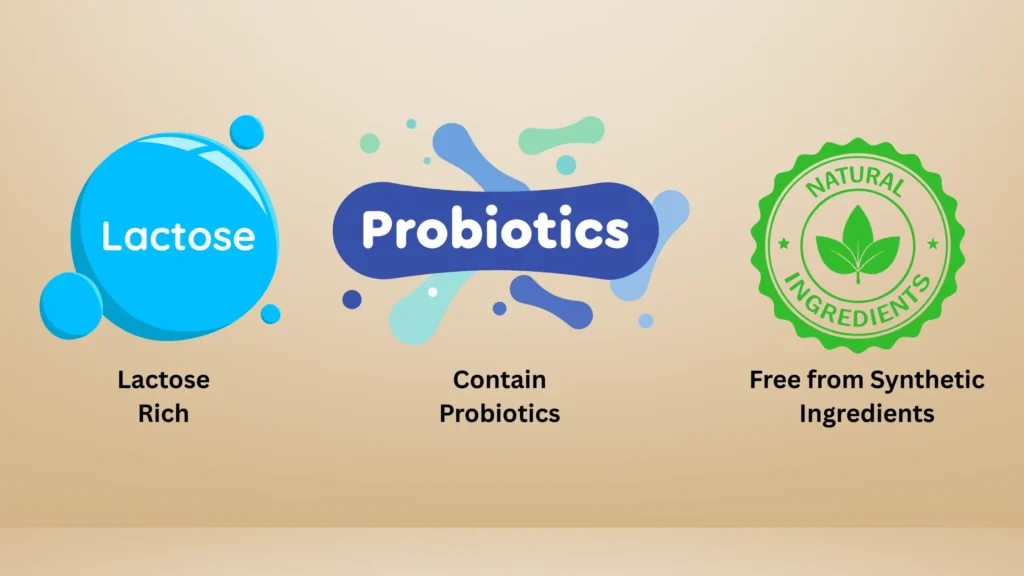
Although breastfeeding offers the best nutrition for babies, many mothers decide to switch to formula feeding or add supplements for a variety of reasons. To make sure your baby keeps getting the nutrients they need for growth and development, it’s critical to choose a formula for your breastfed child that closely resembles the makeup of breast milk. When selecting the best organic baby formula for your breastfed child, keep the following qualities in mind:
Include Lactose
The primary carbohydrate in breast milk is lactose, which plays an essential role in giving babies energy. Approximately seven percent of the lactose in breast milk contributes the natural sugars required in brain development, energy production, and general body development.
Lactose must be the main carbohydrate in any formula you give your baby because it is most closely related to the composition of breast milk. Since lactose is easier to digest than other sugars, it should be used in baby formulas. Furthermore, it won’t cause many digestive issues like gas, bloating, or constipation like other substitutes like glucose and corn syrup solids do.
Why Lactose is Important:
- Essential Energy Source: It provides the necessary fuel for your baby’s rapidly growing brain and body.
- Gentle on Baby’s Digestive System: Lactose in organic formulas is digested easily by infants, reducing the risk of digestive distress.
- Supports Brain Development: Lactose helps provide the right balance of nutrients to fuel early brain development, as it is a key component of breast milk.
Contain Probiotics
Probiotics are beneficial bacteria that help maintain a healthy balance in the gut. They are naturally found in breast milk, which is why they play a crucial role in your baby’s health. The Best rganic baby formulas that contain probiotics can provide the digestive support your baby needs, especially when transitioning from breast milk to formula.
Probiotics in organic formulas can:
- Support Gut Health: Probiotics promote the growth of healthy bacteria in your baby’s intestines, which helps in digestion and nutrient absorption.
- Reduce Digestive Issues: Probiotics can help prevent and manage common baby digestive issues, such as colic, constipation, or bloating, by encouraging a healthy gut flora balance.
- Boost the Immune System: The gut is a major part of your baby’s immune system. Probiotics support immune health by improving gut flora, which, in turn, boosts the body’s ability to fight infections and illnesses.
Look for formulas that list strains like Bifidobacterium or Lactobacillus on the label, as these are common probiotics found in breast milk and are especially beneficial for infants.
Why Probiotics Matter:
- Gut Health: Probiotics promote the growth of good bacteria, supporting a healthy and functioning digestive system.
- Immune System Support: Since a significant portion of the immune system is located in the gut, probiotics help build your baby’s immunity.
Be Free from Synthetic Ingredients
One of its main benefits is the certainty that the category of best organic baby formula does not contain harmful chemicals, artificial additives, and preservatives. Infants are vulnerable to substances that may hamper their digestive system or lead to long-term health complications, especially non-breastfed infants. That’s why it’s essential to avoid formulas containing synthetic ingredients, such as artificial flavors, colors, or preservatives.
Look for organic formulas that:
- Avoid Artificial Colors and Flavors: These chemicals have no nutritional value and can cause allergic reactions or digestive issues in some babies.
- Don’t Contain Synthetic Preservatives: Preservatives can be harmful to a baby’s developing body and digestive system. Organic formulas avoid these chemicals by using natural alternatives.
- Use Only Certified Organic Ingredients: These formulas should be made with natural, pesticide-free ingredients and meet strict organic certification standards. This ensures your baby gets only the healthiest nutrients without exposure to harmful substances.
Why Avoid Synthetic Ingredients:
- Healthier Option: Your baby is less likely to be exposed to dangerous substances when using organic formulas that are devoid of chemicals, growth hormones, and artificial additives.
- Easier Digestion: Synthetic ingredients may result in allergic reactions, digestive discomfort, or even the emergence of food sensitivities in infants with delicate digestive systems.
- Chemical-Free Feeding: Organic formulas put an emphasis on purity and simplicity, guaranteeing that your child is given the most natural and nourishing food available.
Health Benefits of Organic Baby Formula
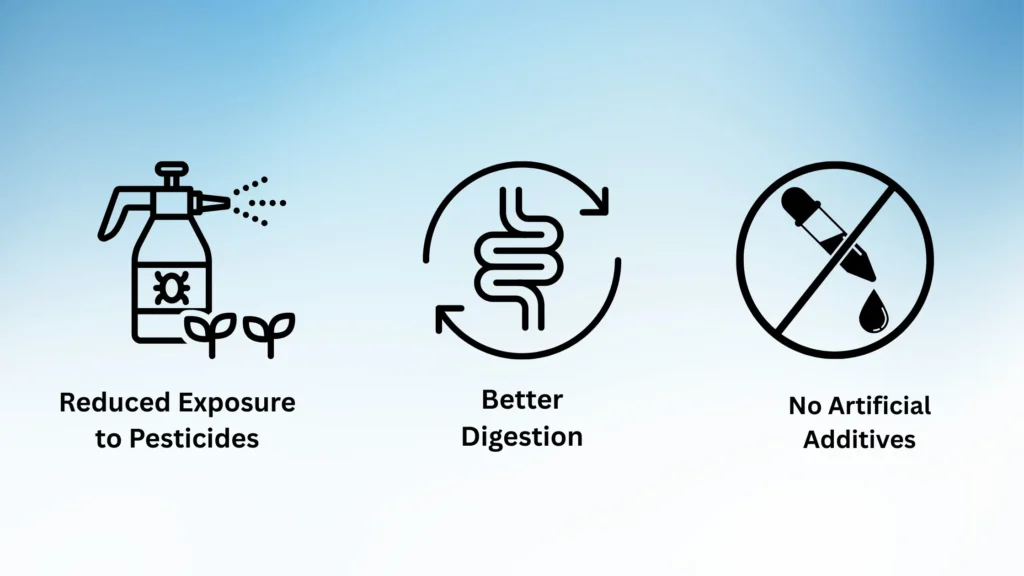
Choosing the best organic baby formula for your child has many health benefits that support growth and development. Organic formulas help minimize the dangers of harmful chemicals and synthetic products and yet give your baby the nutrients they require. The principal health advantages of organic baby formula are the following:
Reduced Exposure to Pesticides
One of the most significant advantages of choosing the best organic baby formula is the reduced exposure to pesticides. Organic farming prohibits the use of synthetic pesticides, herbicides, and fertilizers, ensuring that the ingredients used in organic formulas are grown without harmful chemicals. Babies, whose immune and digestive systems are still developing, are particularly vulnerable to the effects of pesticides and other chemicals.
- Why It Matters: Pesticides used in conventional farming can leave residues on fruits, vegetables, and grains that enter the food chain, potentially affecting your baby’s health. You can reduce your baby’s exposure to these chemicals, which can lead to long-term health problems like allergies, developmental delays, and some diseases, by choosing organic baby formula.
- Health Impact: Reducing exposure to pesticides lowers the risk of chemical sensitivities, allergic reactions, and potential hormonal disruptions. Organic formulas give parents peace of mind knowing that the ingredients are free from harmful chemical residues.
No Artificial Additives
Many conventional baby formulas contain artificial additives such as preservatives, colors, sweeteners, and flavor enhancers to improve taste, shelf life, and appearance. These additives often serve no nutritional purpose but can have harmful effects on your baby’s delicate system.
Organic formulas, on the other hand, are typically free from these artificial ingredients. They are made using natural, wholesome ingredients without the need for artificial preservatives, colors, or flavors.
- Why It Matters: Organic formula will ensure that pure, clean nutrients reach your baby without any unnecessary chemicals that will damage their health. The digestive system of babies is highly sensitive and the artificial additives may irritate their stomachs, create allergies or bring about other discomforts such as gas, bloating, skin reactions, among other things.
- Health Impact: By choosing organic formulas that are free from artificial additives, you can help promote a healthier digestive system and minimize the risk of allergic reactions or sensitivities. This also ensures that your baby’s growth is supported by natural, nutrient-dense ingredients, rather than by substances with potential negative side effects.
Better Digestion
Compared to their conventional counterparts, organic formulas frequently contain ingredients that are easier to digest. Whey-based proteins, for instance, are used in a lot of organic formulas because they are kinder to a baby’s digestive tract than casein-based proteins. Organic formulas are a good option for infants who are switching from breast milk to formula or who may have sensitive stomachs.
- Why It Matters: A baby’s digestive system is still developing, and introducing easily digestible foods is essential to prevent issues such as constipation, reflux, or colic. Organic formulas that use high-quality proteins and fats promote smoother digestion and reduce the chances of digestive upset.
- Health Impact: Prebiotics and probiotics, which support beneficial gut flora and facilitate digestion, are also found in many organic formulas. Probiotics can boost the immune system and lower the risk of gastrointestinal problems, while prebiotics aid in the development of good bacteria in the gut. Organic formulas can ease your baby’s discomfort and digestive issues by promoting better digestion.
Potential Drawbacks of Organic Baby Formula
Although there are many advantages to using organic baby formulas, parents should weigh a few possible disadvantages before choosing one. The primary issues are as follows:
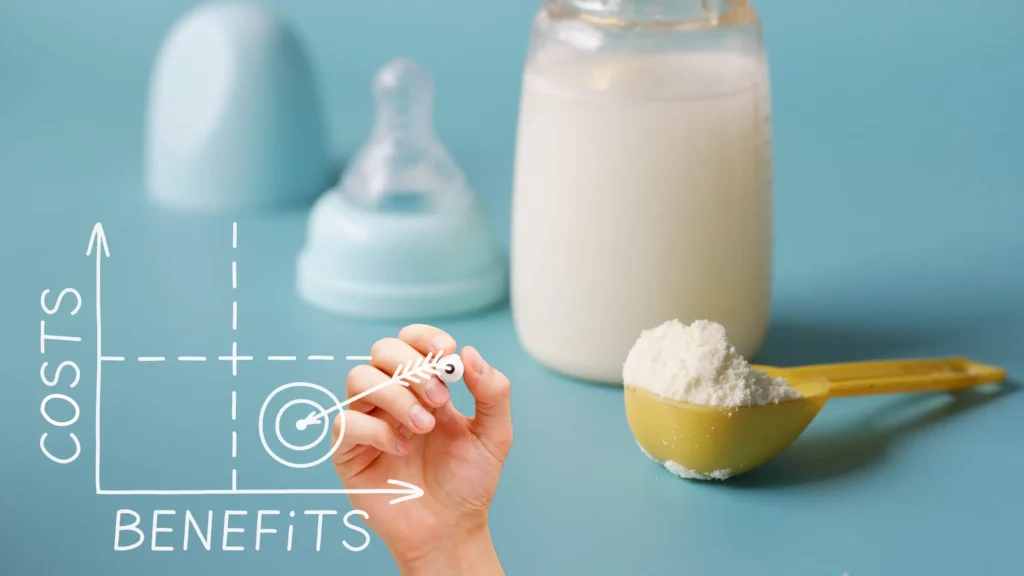
Cost
One of the primary drawbacks of organic baby formula is the higher cost compared to conventional formulas. Organic ingredients are often more expensive to produce due to the strict farming and production standards required for organic certification. This can translate into higher prices for consumers.
- Why It Matters: For many families, the cost of organic baby formula can be a significant concern. The price difference may make it challenging for some families to afford organic formulas consistently, especially if their baby requires a large quantity of formula during the first few months.
- Health Impact: While the organic formula offers cleaner ingredients, it’s important to weigh the costs against the potential budget constraints. To save money, some parents might decide to use organic formula only sometimes or add conventional formula when needed. In these situations, it’s crucial to make sure your infant continues to get a healthy diet, whether from conventional or organic sources.
- Long-Term Impact: Over time, the higher cost of organic baby formulas can add up, especially if your baby is formula-fed for an extended period. Families may need to adjust their budgets or look for deals and bulk purchasing options to make organic formulas more affordable.
Availability
Another challenge with organic baby formula is its availability. Even though organic products are growing in popularity, local pharmacies and grocery stores might not always carry organic formulas. Parents may find it more difficult to consistently find the formula they prefer as a result, particularly if they have a particular brand or type in mind.
- Why It Matters: Not all stores carry organic baby formulas, and even when they do, the selection may be limited. This can be particularly inconvenient if you need to purchase formula at the last minute or if you don’t have access to a local store that stocks organic options.
- Online Purchasing: While organic baby formulas are often available online, ordering online may require planning ahead. Some families may prefer to buy formula in person when they need it right away, and delivery times may differ. Shipping fees might also be applicable when placing an online order, which would increase the overall cost.
- Health Impact: If parents have particular dietary requirements, such as lactose intolerance or allergies, limited availability may also make it more difficult for them to find the best formula for their child. In such cases, the inability to quickly access the preferred formula can be stressful for both the baby and the parents.
FAQ Section on Choosing the Best Organic Baby Formula
1. What is the difference between organic and regular baby formula?
Organic baby formulas are safer and more natural for infants because they are made from ingredients that are grown without the use of artificial chemicals, pesticides, or genetically modified organisms.
2. Can organic baby formula replace breast milk completely?
While breast milk is ideal, organic baby formula can serve as a supplement when breastfeeding is not possible. Some parents may use it to completely replace breast milk, but it’s important to consult with a pediatrician first.
3. Is organic baby formula safe for newborns?
In general, organic baby formula is safe for infants. But it’s crucial to pick a formula that satisfies all of your baby’s nutritional requirements. Before introducing the formula, make sure to consult your pediatrician.
4. Is organic baby formula better than other formulas?
Some parents believe that organic baby formula is superior because it contains natural ingredients and doesn’t contain chemicals or pesticides. But it’s crucial to pick the formula that best suits your baby’s requirements..
Conclusion: Best Organic Baby Formula
Your baby will receive a safe, wholesome, and nutritious substitute for breast milk or conventional formula if you choose the best organic baby formula. By choosing organic, you’re promoting your child’s health and development from the start by avoiding chemicals in their early years.
Explore more on Pregnancy Must –
